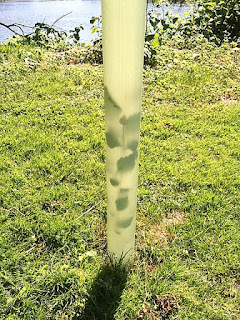Rivers are the lifeblood of our world. They bring water, recreation, habitat for life, and transportation.
But tributaries to major rivers are also important, and sometimes, neglected.
Back
in May we skipped walking in our local park for a few days. (If you
read my Skywatch Friday posts, some of my sky pictures are taken in that
park.)
When we walked there once again, we noticed vertical plastic tubes all along the bank. This is near where a tributary of the Susquehanna River flows into the main river.
This picture shows the sapling inside one of the tubes.
There is a sign near these plantings directing you to a website explaining a program called "Trees for Tribs" for more information.
I went to the website and found some interesting information about the importance of stream-side buffers along waterways, which I am taking the liberty of posting here.
"Vegetation, such as trees, shrubs, and grasses along waterways creates a natural buffer that protects the water and provides many benefits. An established streamside buffer:
- slows down and filters run off, preventing pollutants from getting into the water,
- intercepts and slows water from heavy rains, reducing the instances of flooding,
- shades streams, creating cooler temperature conditions to support fish species such as trout,
- holds soil in place, preventing streambanks from eroding away during heavy rains, and
- provides food and habitat for invertebrates, fish and other wildlife.
To find out more about stream buffers and their benefits, check out our stream buffer fact sheet."
The
park we walk in has flooded (no surprise; it is located in a low area
and I suspect that's why it's not developed) a number of times over the years and we noticed, this spring, a
lot of erosion by the riverbank. This erosion is trouble for the health
of the tributary and I'm pleased the state has this program.
The organization that planted these trees provided by the state program (I'm not sure if it was our town or a nonprofit that planted these) has to commit to caring for these baby trees.
Trees care for so much of nature and now I know they care for rivers, too.
The types of trees planted aren't marked although, according to the Department of Conservation website, they may include " wetland rose, pussy willow, ninebark, winterberry, and red oak."
It will be interesting, in the coming years, to see if these plantings will alleviate the trouble our tribs are in.
Joining Parul at Happiness and Food for #ThursdayTreeLove.



...trees aren't just for beauty!
ReplyDeleteOne of my 'claims to fame' when I was in office was to start a campaign to get rid of purple loosestrife in our community. The plants invade wetlands and cause serious issues with the ecology. My community is the headlands for three large rivers in the metro area and I actually live on a branch of the Rouge River.
ReplyDeleteSounds like a wonderful program. We need our trees.
ReplyDeleteWhat would our world be without trees? Well, it would be a barren wasteland unfit for habitation. In so many ways, we owe our existence to trees and streams and rivers owe their health to them.
ReplyDeleteGlad to hear about the 'buffers' ~ nature needs help right now ~ great post and photos ~ thanks, Xo
ReplyDeleteWishing you good health, laughter and love in your days,
A ShutterBug Explores,
aka (A Creative Harbor)
People around here seem to love to mow, and trees get in the way of that, so folks are reluctant to plant them. If it were up to me, I'd keep the grasses and the trees.
ReplyDeleteNice that they were able to plant them.
ReplyDeleteWonderful initiative. I am sure the trees will help the river over time.
ReplyDeleteNice to hear about this initiative, glad to hear they have planted trees..hope this will be helpful.. thank you for sharing.
ReplyDeleteThat's a wonderful initiative. When man works with nature good things are bound to happen. Have a beautiful week, Alana
ReplyDeleteWow, saplings in tube, this seems an interesting program, Thanks for sharing about "Tree for Tribs"
ReplyDeleteLove to see this. I have small plants in water and I see small sapling grow in the bottle and they look like hope to me. Thanks for sharing about the initiative and I think it's a good one.
ReplyDeleteMy son's recent science fair project focused on a similar issue. Thanks for sharing and for all the information and links!
ReplyDelete